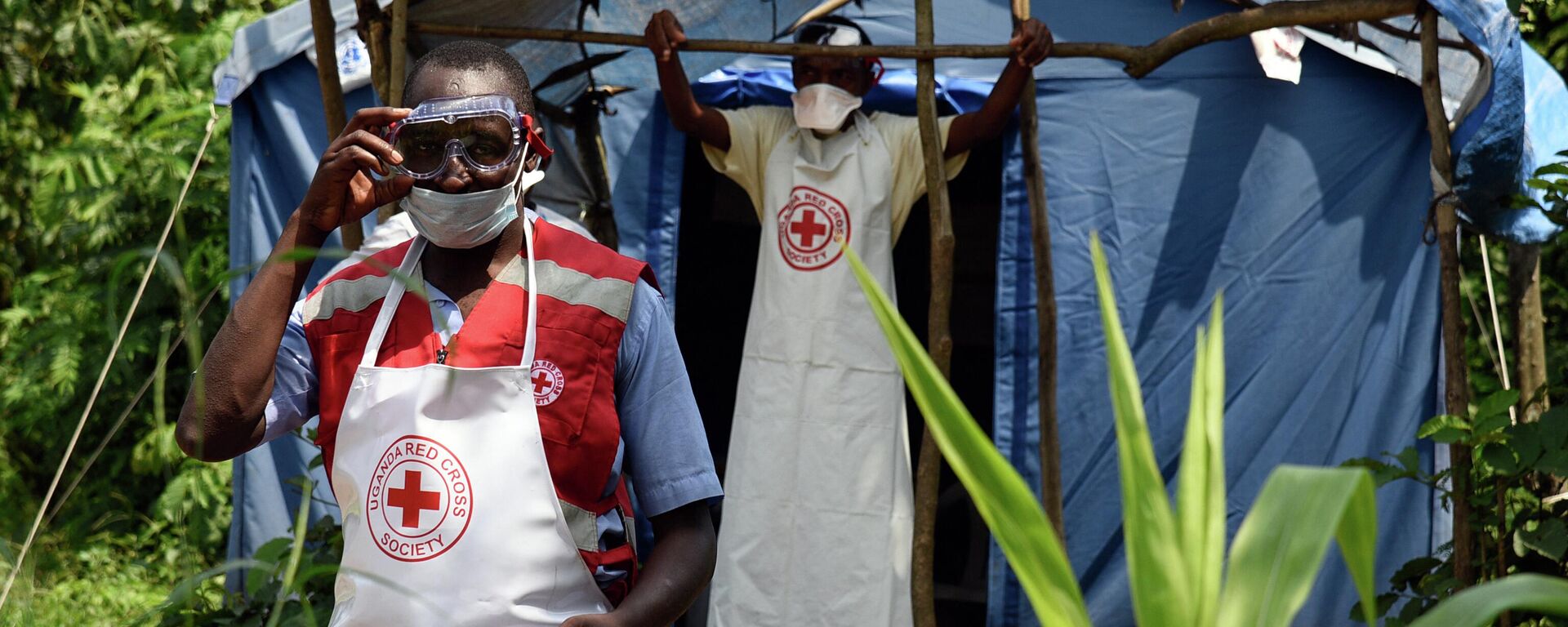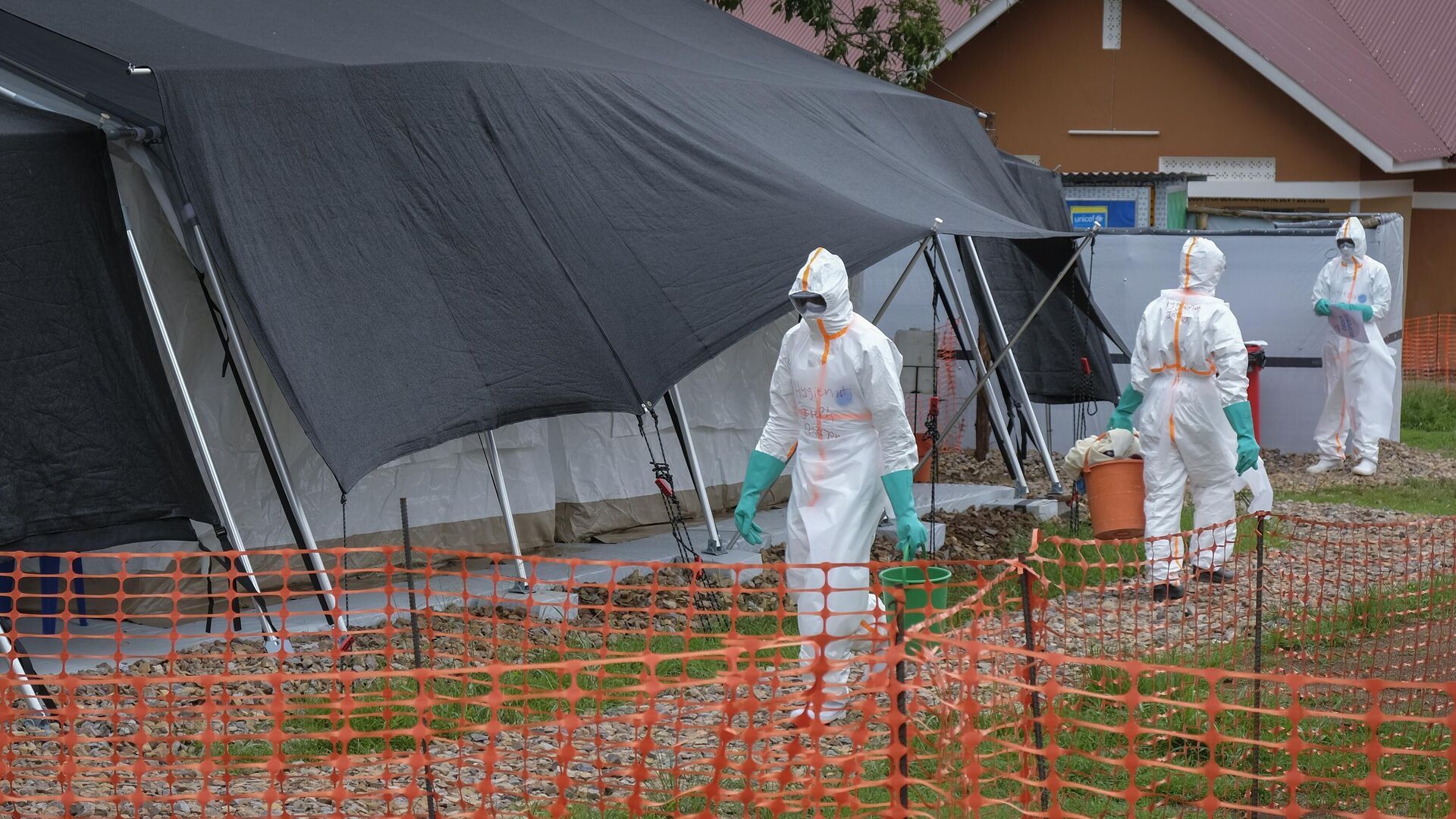https://sputnikglobe.com/20221218/all-ebola-related-restrictions-lifted-in-uganda-1105559183.html
All Ebola-Related Restrictions Lifted in Uganda
All Ebola-Related Restrictions Lifted in Uganda
Sputnik International
In this article you will read about Uganda removing Ebola-related restrictions
2022-12-18T09:21+0000
2022-12-18T09:21+0000
2022-12-18T09:21+0000
africa
east africa
uganda
ebola
ebola outbreak
ebola treatment
ebola vaccine
quarantine
lockdown
restriction measures
https://cdn1.img.sputnikglobe.com/img/07e6/0c/12/1105559270_0:12:3072:1740_1920x0_80_0_0_8ffcf5cf9db28ee7c1e682806a992f45.jpg
Uganda president Yoweri Museveni has removed all restrictions imposed in response to the Ebola outbreak.Uganda announced an Ebola outbreak in late September after the Ebola Sudan strain was detected in the country. In response to the outbreak, on October 15, Museveni imposed a 21-day quarantine in Uganda’s two central districts, Mubende and Kassanda, which were hardest hit by the outbreak. The quarantine, which implied limited access to and from the two regions, as well as a curfew from 7 p.m. to 6 a.m. has been extended twice on November 5 and November 26 for the same period. Uganda discharged its last Ebola patient in early December, while maintaining restrictions in place until 21 days were over. The World Health Organization (WHO) has commented on the achievement, saying that to ensure that Ebola has been eradicated, the country must wait 42 days, which is equivalent to two incubation periods.The virus that broke out in Uganda was the Sudan strain of Ebola, for which there is currently no proven vaccine, unlike the more common Zaire strain. At the same time, the Sudan strain is known to kill 40%-60% of those it infects.In early December, the WHO delivered 1,200 candidate vaccines against the Sudan strain to Uganda as the first batch of one of the three potential vaccines recommended by the UN body for a clinical trial called “Tokomeza Ebola.” Now Uganda is expected to evaluate the efficacy of the Oxford, Sabin, and Merck trial vaccines.Ebola is a severe viral infection that affects humans and several animal species, primarily primates. The virus can be transmitted from person to person via the exchange of bodily fluid or through contact with infected objects. High fever, diarrhea, abdominal pain, blood vomiting, fatigue, and hemorrhaging are all common symptoms.The recent Ebola outbreak in Uganda is not the first one for the African country. The previous outbreaks in Uganda were detected in the years 2000 (224 deaths), 2007, (37 deaths), 2011, (1 death), 2012 (21 deaths), and 2019 (four deaths).
https://sputnikglobe.com/20221016/nearly-one-million-quarantined-in-uganda-as-ebola-outbreak-spreads-1101897605.html
africa
east africa
uganda
Sputnik International
feedback@sputniknews.com
+74956456601
MIA „Rossiya Segodnya“
2022
News
en_EN
Sputnik International
feedback@sputniknews.com
+74956456601
MIA „Rossiya Segodnya“
Sputnik International
feedback@sputniknews.com
+74956456601
MIA „Rossiya Segodnya“
ebola-related restrictions in uganda are removed, ebola outbreak in uganda, sudan strain of ebola in uganda, end of lockdown in uganda, end of quarantine in uganda
ebola-related restrictions in uganda are removed, ebola outbreak in uganda, sudan strain of ebola in uganda, end of lockdown in uganda, end of quarantine in uganda
All Ebola-Related Restrictions Lifted in Uganda
The most recent Ebola outbreak in Uganda was confirmed in September, with at least 142 cases and 55 deaths. However, earlier this month, the last known Ebola patient in Uganda was discharged from the hospital and no more cases have been registered to date.
Uganda president Yoweri Museveni has removed all restrictions
imposed in response to the Ebola outbreak.
"Currently, there is no transmission, no contact under follow-up, no patients in the isolation facilities, and we are progressing well with the count down," the president stated.
Uganda announced an Ebola outbreak in late September after the Ebola Sudan strain was detected in the country. In response to the outbreak, on October 15, Museveni imposed a 21-day quarantine in Uganda’s two central districts, Mubende and Kassanda, which were hardest hit by the outbreak. The quarantine, which implied
limited access to and from the two regions, as well as a curfew from 7 p.m. to 6 a.m. has been extended twice on November 5 and November 26 for the same period.
Uganda discharged its last Ebola patient in early December, while maintaining restrictions in place until 21 days were over. The World Health Organization (WHO) has
commented on the achievement, saying that to ensure that Ebola has been eradicated, the country must wait 42 days, which is equivalent to two incubation periods.
The virus that broke out in Uganda was the Sudan strain of Ebola, for which there is currently no proven vaccine, unlike the more common Zaire strain. At the same time, the Sudan strain is known to kill 40%-60% of those it infects.

16 October 2022, 10:18 GMT
In early December, the WHO
delivered 1,200 candidate vaccines against the Sudan strain to Uganda as the first batch of one of the three potential vaccines recommended by the UN body for a clinical trial called “Tokomeza Ebola.” Now Uganda is expected to evaluate the efficacy of the Oxford, Sabin, and Merck trial vaccines.
Ebola is a severe viral infection that affects humans and several animal species, primarily primates. The virus can be transmitted from person to person via the exchange of bodily fluid or through contact with infected objects. High fever, diarrhea, abdominal pain, blood vomiting, fatigue, and hemorrhaging are all common symptoms.
The recent Ebola outbreak in Uganda is not the first one for the African country. The previous outbreaks in Uganda were
detected in the years 2000 (224 deaths), 2007, (37 deaths), 2011, (1 death), 2012 (21 deaths), and 2019 (four deaths).



